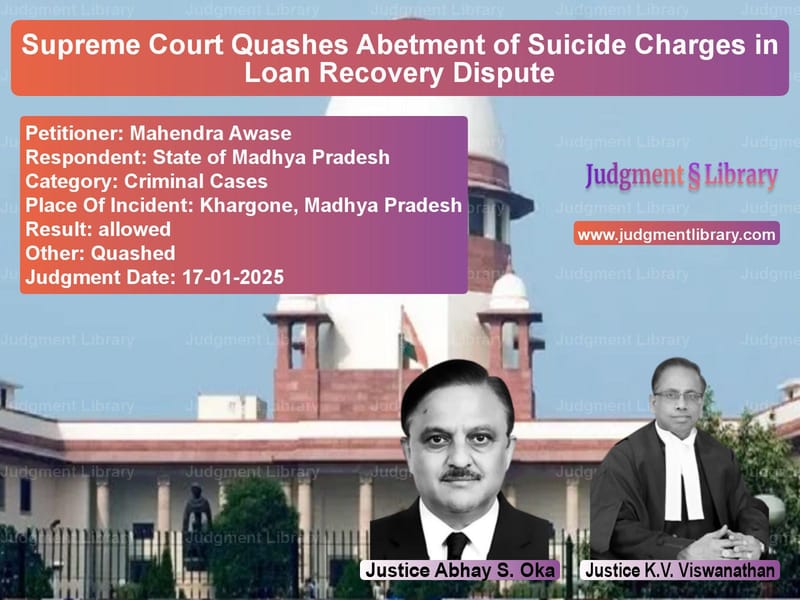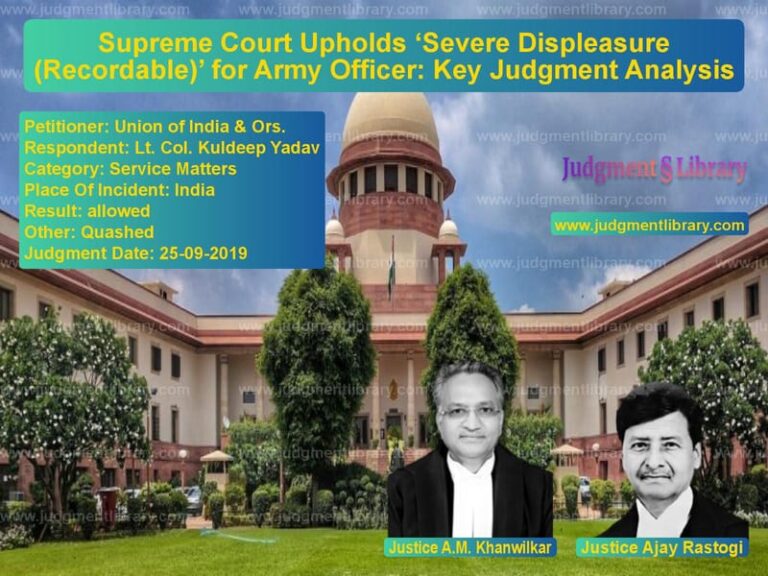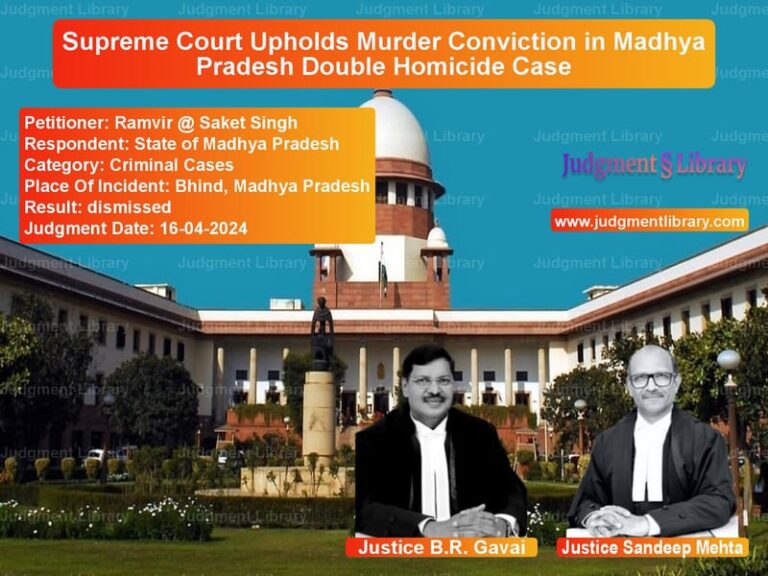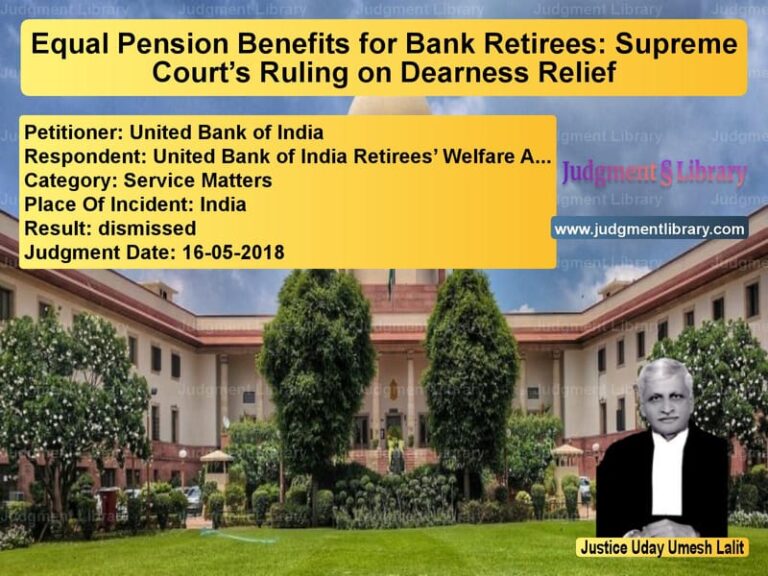Supreme Court Quashes Abetment of Suicide Charges in Loan Recovery Dispute
In a significant judgment, the Supreme Court of India in Mahendra Awase v. The State of Madhya Pradesh addressed the wrongful invocation of Section 306 of the Indian Penal Code (IPC) in cases involving loan recovery disputes. The case arose from allegations that the appellant, Mahendra Awase, had abetted the suicide of a borrower’s guarantor by pressuring him for loan repayment. The Supreme Court, however, ruled that mere demands for repayment do not constitute ‘instigation’ under Section 306 IPC.
Case Background
The case revolved around the suicide of Ranjeet Singh, who was found hanging from a tree on October 11, 2022, near Borgaon drain in Khargone, Madhya Pradesh. A suicide note recovered at the scene alleged that Ranjeet was being harassed by the appellant, Mahendra Awase, in connection with a loan taken by one Ritesh Malakar. The appellant was an employee of Shree Saakh Cooperative Society Limited and was responsible for collecting outstanding loans.
Key Events Leading to the Case
- On October 11, 2022, Ranjeet Singh left home and was later found dead.
- A suicide note mentioned that he was harassed over a loan repayment issue.
- Audio recordings of conversations between Ranjeet and the appellant indicated that Awase had pressured him for repayment but did not explicitly instigate suicide.
- On December 31, 2022, an FIR was filed against the appellant, nearly three months after the incident.
- The appellant was charged under Section 306 IPC for abetment of suicide.
Legal Issues and Arguments
Petitioner’s Arguments
Mahendra Awase, through his counsel, contended that:
- Mere pressure for loan repayment does not constitute abetment of suicide.
- The prosecution failed to establish a direct link between the appellant’s actions and the suicide.
- The FIR was lodged with an unexplained delay of two months and twenty days.
- Past Supreme Court judgments establish that casual remarks or financial disputes do not amount to ‘instigation’.
Respondent’s Arguments
The State of Madhya Pradesh argued that:
- The suicide note explicitly named the appellant as responsible for Ranjeet’s distress.
- Audio transcripts showed that the appellant threatened to put up banners at Ranjeet’s house and inform his neighbors.
- Ranjeet had expressed his helplessness due to persistent harassment.
- The appellant’s conduct pressured the deceased to an extent that he saw no alternative but suicide.
Supreme Court’s Analysis and Key Observations
The Supreme Court, comprising Justices Abhay S. Oka and K.V. Viswanathan, carefully examined the case and ruled in favor of the appellant.
Interpretation of Section 306 IPC
The Court reiterated the established legal principle that for an offense under Section 306 IPC, the following must be proven:
- There must be clear instigation by the accused.
- The accused must have intended that the deceased commit suicide.
- There must be a direct link between the accused’s actions and the suicide.
- Mere financial disputes or heated exchanges do not amount to abetment.
Key Precedents Cited
The Court referred to several landmark judgments:
- Swamy Prahaladdas v. State of M.P. – Held that casual remarks like ‘go and die’ do not constitute abetment of suicide.
- Madan Mohan Singh v. State of Gujarat – Ruled that abetment requires specific intent to push the deceased to suicide.
- Amalendu Pal v. State of West Bengal – Held that mere harassment is insufficient to establish abetment unless there is active encouragement.
- M. Mohan v. State – Clarified that abetment must involve a direct or active role leading to suicide.
Supreme Court’s Conclusion
The Court found that the appellant’s actions, even if taken at face value, did not constitute abetment of suicide. The judgment emphasized:
- Loan recovery efforts, even if aggressive, do not amount to ‘instigation’ under Section 306 IPC.
- The appellant was performing his duty as a loan recovery agent and had no intent to push the deceased towards suicide.
- The prosecution failed to show a direct causal link between the appellant’s actions and the suicide.
- Criminal liability under Section 306 IPC cannot be imposed in a routine manner, and trial courts should exercise caution before framing charges.
Final Judgment
The Supreme Court quashed the charges against Mahendra Awase and discharged him from all proceedings. The Court criticized the misuse of Section 306 IPC and urged law enforcement agencies to ensure that abetment of suicide charges are not applied indiscriminately.
Implications of the Judgment
This ruling sets a strong precedent against the wrongful use of abetment of suicide charges in financial disputes. It reinforces the principle that loan recovery efforts, without explicit instigation, cannot be criminalized. The judgment serves as a cautionary reminder for law enforcement agencies to apply Section 306 IPC judiciously and avoid prosecuting individuals without clear evidence of intent and causation.
Petitioner Name: Mahendra Awase.Respondent Name: State of Madhya Pradesh.Judgment By: Justice Abhay S. Oka, Justice K.V. Viswanathan.Place Of Incident: Khargone, Madhya Pradesh.Judgment Date: 17-01-2025.
Don’t miss out on the full details! Download the complete judgment in PDF format below and gain valuable insights instantly!
Download Judgment: mahendra-awase-vs-state-of-madhya-prad-supreme-court-of-india-judgment-dated-17-01-2025.pdf
Directly Download Judgment: Directly download this Judgment
See all petitions in Suicide Cases
See all petitions in Bail and Anticipatory Bail
See all petitions in Fraud and Forgery
See all petitions in Judgment by Abhay S. Oka
See all petitions in Judgment by K.V. Viswanathan
See all petitions in allowed
See all petitions in Quashed
See all petitions in supreme court of India judgments January 2025
See all petitions in 2025 judgments
See all posts in Criminal Cases Category
See all allowed petitions in Criminal Cases Category
See all Dismissed petitions in Criminal Cases Category
See all partially allowed petitions in Criminal Cases Category







